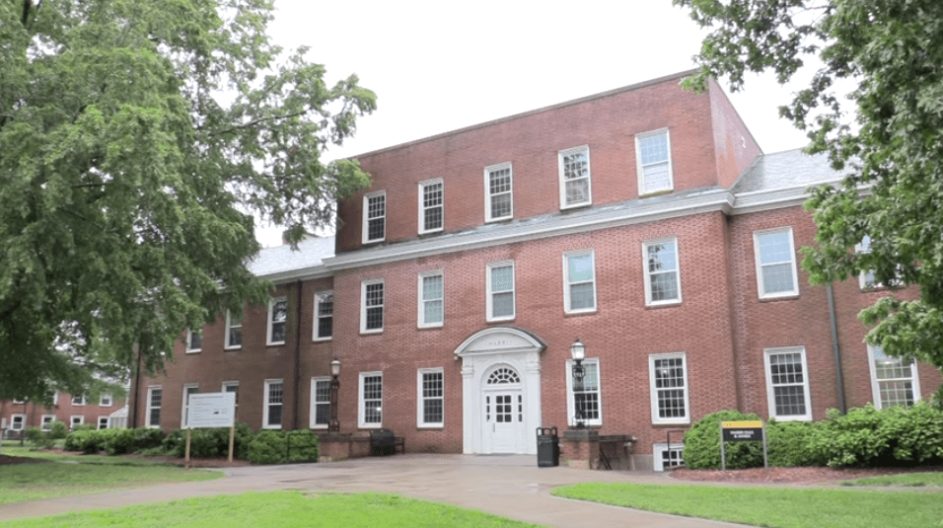
Harris Renovations Accommodate Growth, Improved Programs
Thanks to just-completed renovations in Harris Science Hall at Pfeiffer University, the Department of Natural Sciences now has four new classrooms and three revamped ones as well as a new conference room and a new suite of faculty offices. As a result, the department can now accommade enrollment growth in its programs, which include biology, chemistry, environmental science, physics and math. Lectures, which once took place in labs, now take place in classrooms that are more conducive to lecturing and group work. The new conference room will host meetings of faculty, research groups and teleconferences with collaborators.
The Harris renovations have also meant additional floor space for the university’s Department of Nursing, which can now accommodate 10 additional nursing students each year, provide another simulation room and offer several new amenities, including a lounge, a locker area and a room for studying. Other renovations help fulfil now-typical requirements, from a new elevator that is ADA-compliant to advances in technology that enable laptop users to collaborate on large TV screens.
Dr. Jason Emory, an associate professor of chemistry, chairs the Department of Natural Sciences. He stressed that each discipline within his department stands to benefit from the renovations, which were funded with part of a $34.5 million Rural Development Community Facilities Direct Loan that Pfeiffer secured from the United States Department of Agriculture.
“The mathematics program, for example, will have room for a math tutoring lab on the third floor,” he said. “This will be a valuable resource for students in the department to get additional help. It will also help students taking any mathematics course. Physics will have a dedicated classroom and lab instead of sharing a classroom and lab with chemistry. They will also have a stockroom in the basement to store equipment.”
Dr. Carrie DeJaco, an associate professor of biology, plugged a new biology classroom in Harris with direct access to the Steve C. Dial Greenhouse, saying it “will make it easier to maintain a plant collection for use in studying plant diversity and will also enable us to more easily conduct experiments with plants.”
DeJaco said that she and her colleagues are also “really excited” about the additional space in Harris for classes and research projects.
“With the current numbers of science majors and the non-majors general education classes that are being taught, scheduling of classes before the renovations could be tough due to space constraints, and there was not much room to leave supplies out for students or to set up research projects that would last more than a few days,” she said. “Having more space will provide us with a lot more flexibility and increase the range of experiments we can do with our students, both in and out of class.”
More faculty offices in Harris have emerged because of the renovations and each is in close proximity to that of a colleague. Before the renovations, professors in the Department of Natural Sciences had offices in various buildings, some shared office spaces, and some spent a lot of time working on their laptops in classrooms and lab spaces.
“Having more offices and having those offices nearer to each other will certainly facilitate communication among the faculty, provide us with a bit more privacy, provide more flexible use of spaces, and make our lives easier,” DeJaco said.
Emory added that the new office suite “will allow synergy between faculty members” of different disciplines. Example: Biology and Chemistry professors are exploring the addition of a Bachelor of Science degree in biochemistry and a Master of Science degree in biomedical science.
As for the renovations affecting nursing, Dr. Martha Bramlett, an associate professor who chairs the Department of Nursing at Pfeiffer, said that each year, her department admits 20 pre-nursing sophomores into its upper-division for nursing students, who take clinical courses during their junior and senior years. So, a maximum of 40 students make up nursing’s upper-division.
The extra space in Harris can now accommodate the admittance of 30 students per junior class and a maximum of 60 upper-division students.
Bramlett stressed that the increase in enrollment in the upper-division is contingent on approval by the N.C. Board of Nursing. The extra classroom space “is necessary for that approval,” she said.
Because of the renovations, the new lounge, locker room and study room will make the study of nursing at Pfeiffer more attractive to prospective students, Bramlett said. She also cited several other benefits that the renovations have brought:
For example, the Department of Nursing has moved classes out of its skills lab and into a regular classroom, freeing up the lab for student practice time.
Also, an additional simulation room has become available and, as a result, nursing has moved the adult critical care manikin to a separate room “so we can run simultaneous simulations and convert one room to the exclusive use of obstetric and pediatric simulations,” Bramlett said. “These simulation rooms are in addition to our existing skills lab.”
In the past, nursing had but one simulation room used for obstetric, pediatric, and adult critical care simulations
Ken Keuffel, who authored this article, has served as Pfeiffer’s Assistant Director of Communications since December 2019. He welcomes story ideas from Pfeiffer’s faculty, staff, students, alumni, and friends. The form for submitting story ideas is Story Idea/News Item Request Form.